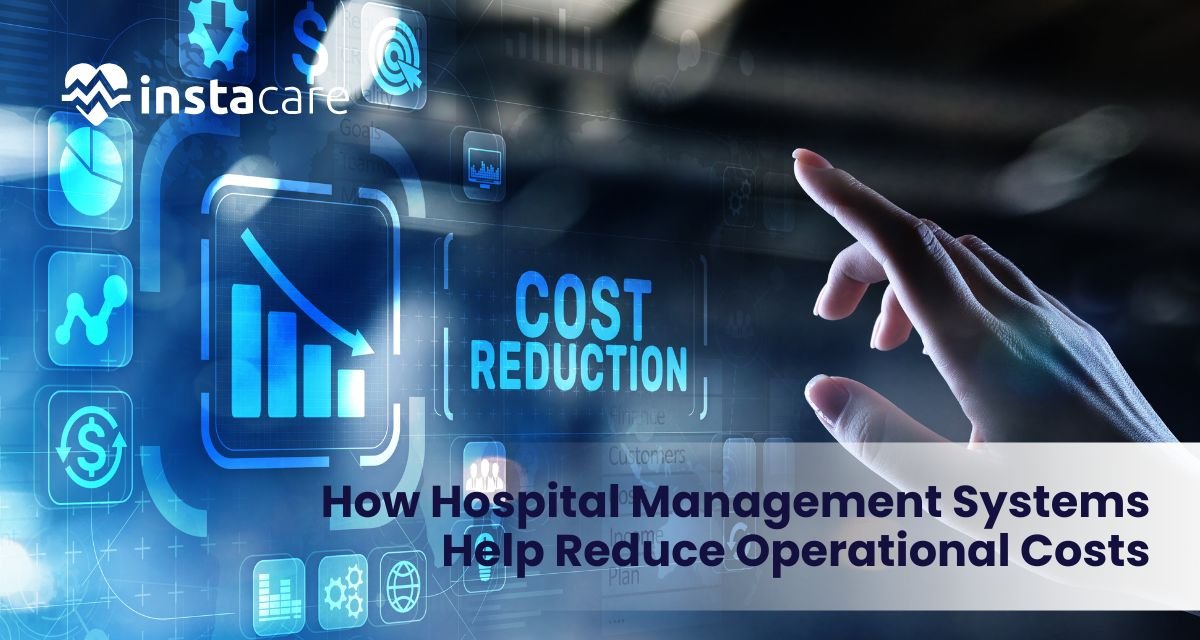Last updated on Monday, 4, November, 2024
With hospitals increasingly adopting digital solutions, Hospital Management Systems have proven to be very effective in managing the operations of a hospital with reduced costs. Since HMS can automate processes, manage resources, and increase the accuracy of data, HMS is an efficient solution for a hospital to control costs without compromising on quality care. Here’s how these systems help in reducing operational costs effectively.
Table of Contents
Administrative Efficiency
One of the most important advantages of the HMS is automated administrative work. Traditionally, most of this work was paper-based and required labour, which made the operational cost higher and the working time greater, instead of focusing on patient care. Hospital Management Systems can automate schedules, admission, billing, and discharge; this reduces unnecessary paperwork and minimises errors occurring from human mistakes.
- Through automation, HMS saves time and requires less additional administrative staff.
- This leads to cost saving and efficiency of the hospital; existing staff will be able to handle more patients while focusing on providing quality care.
- By reducing paper-intensive documentation, HMS helps hospitals attain a more streamlined process in administration.
Less Errors In Billing And Documentation
These can have serious monetary costs on the hospitals. For example, miscommunication between a billing and a doc in medical billing or in other instances of mis documentation means delays in payments, an insurance issue, or a lawsuit, therefore increased operating expenses. Hospital Management Systems therefore reduce such mistakes to be produced by allowing data entries accurately and in real-time.
- With HMS, data is input once and available to several departments so that duplication entry possibilities or inconsistent data are minimal.
- Automated billing systems ensure accuracy as procedures are matched with proper billing codes and also reduce chances of claims being rejected.
- Proper documentation also aids revenue flow since there are time and accurate insurance claims paid so less financial loss due to billing problems.
Optimize Resource Allocation And Inventory Management
Resource distribution is a very important function that happens in a hospital. The hospital management system provides information related to resources used in real-time. The staff members of the hospital monitor bed availability, staff assignments, and patient flow in the hospital because of this system. They can prevent wastage and overheads by monitoring the resources used.
Improve Effective Communication Among Departments
Effective communication in any health institution impacts both the patients and the management of the resources. In this respect, Hospital Management Systems have boosted interdepartmental communication by establishing a central hub where staff members can gain and update information concerning patient histories, test results, and treatment plans.
It heightens coordination across departments and lessens the degree of repeated communication, which can further delay operations and increase cost. For example, the laboratory findings can be transmitted promptly to the attending physician, and therefore a decision might be made more quickly.
Enabling Quick Staff Management
Labor costs form a huge chunk of the expenses of a hospital, and efficient management of staff can really make a difference in operational costs. Hospital Management Systems manage the staff and shift with the help of the administrator to monitor employee schedules, track attendance, and evaluate productivity. Thus, each department is well-staffed without overstaffing, which can be an unnecessary expense in labor.
HMS also offers analytics and data on when more staff is required at a particular time and where fewer resources are needed. Staffing levels correlated with actual demand avoid overtime hours, which are very costly, and reduce the overall wage bill. Good management of staff also boosts morale, reduces burnout, and thus translates to fewer turnover rates and related costs of recruiting.
Enabling Telemedicine And Remote Consultation
Telemedicine is gaining popularity as it has low-cost methods of serving remote or underserved populations. Hospital Management Systems enable telemedicine capabilities using video conferencing and remote monitoring and virtual consults that are enhanced by the system. This capability enables a hospital to cater to a larger population without necessarily expanding physical infrastructure.
- Telemedicine also decreases the cost of care for the more minor complaints that can not be examined in the patient’s presence.
- Reducing patient admission rates due to telemedicine enables the hospitals to maintain better levels of bed occupancy and enable more critical resources to be provided for the critical cases.
- Telemedicine also decreases the operational costs as the less utilisation of physical facilities along with the support staff takes place.
Streamlining Patient Discharge Processes
The process of patient discharge in hospitals is complex and time-consuming. It can increase costs quite a lot because of prolonged stay time for patients. The use of Hospital Management Systems wipes out this by automating documentation for discharges, linking with the billing department for billing, and reminding people in charge of pending discharge procedures. This makes all discharge procedures quite quick and efficient, thereby saving undue delay and releasing the occupied beds to accommodate other new patients.
- By using HMS, employees can view the real-time progress of the discharge procedure in their workstations.
- This enables all paperwork, education on patient instructions, and billing to be communicated in a timely manner.
- Optimising discharge workflows also helps reduce unnecessary stays within hospitals, thus reducing overheads and improving the rate of turnover of patients.
Compliance With Regulations
Hospital compliance with HIPAA, GDPR, and others, can call for heavy fines and legal action. Compliance-driven activities are often expensive, especially when the work is intensive in documentation, audits, and reports. The Hospital Management System streamlines compliance by automatically updating documentation, along with real-time tracking of all the necessary compliance data.
Improve Data Security And Minimise Cybersecurity Threats
Besides the cost of legal fees and penalties, loss of patient trust after a data breach can be very costly to hospitals. Hospital Management Systems improve data security by implementing strong access controls, data encryption, and multi-factor authentication. This minimises unauthorised access and keeps sensitive information about patients safe.
Support Predictive Analytics To Make Better Decisions
Hospital Management Systems can be further enhanced with predictive analytics as it helps hospitals make some data-driven decisions. While analysing historical data, HMS can predict trends in admitting patients, usage of consumables, and the strength of staff. This will help the hospital prepare for peak times when more patients are admitted with proper stock of consumable supplies and adequate staffing, thus saving costs.
Final Thoughts
Hospital Management Systems are beneficial for cutting the operational cost in a healthcare facility. Automating administrative tasks, enhancing interdepartmental communication, resource utilisation optimization, and data security enhance the effectiveness of running a hospital as well as the cost-effectiveness. Telemedicine, predictive analytics, and regulatory compliance also cut down costs without sacrificing quality care to patients. With ongoing evolutions of hospitals in a more digitised setting, investment into such a comprehensive HMS will remain indispensable to ensure better patient outcomes as well as financial sustainability.
FAQs
How does HMS help in lowering the cost of operations?
HMS lowers the operational cost of a hospital through automating administrative tasks, the minimization of billing errors, and the optimal usage of resources. Since it allows hospitals to optimize resource utilization and reduce wastage and labor costs through better process efficiency and accurate data, HMS is also a very cost-effective proposition for patients.
What is the role of HMS in the management of resources?
HMS also provides real time insight on resource usage from level of beds to inventory, which allows the hospitals to track usage of resources and be in a position to get them restocked timely enough. It saves hospitals from overstocking and shortfalls which create unnecessary spending and wastage while maximizing resource usage.
Is HMS helpful in managing staff costs?
Yes, HMS optimizes the level of staffing by monitoring attendance, shift management, and predicting peak times. It saves them from overpaying for overtime and giving better labor allocation, allowing the hospitals to efficiently manage labor expenses and eventually make sure they have an efficient workforce.



